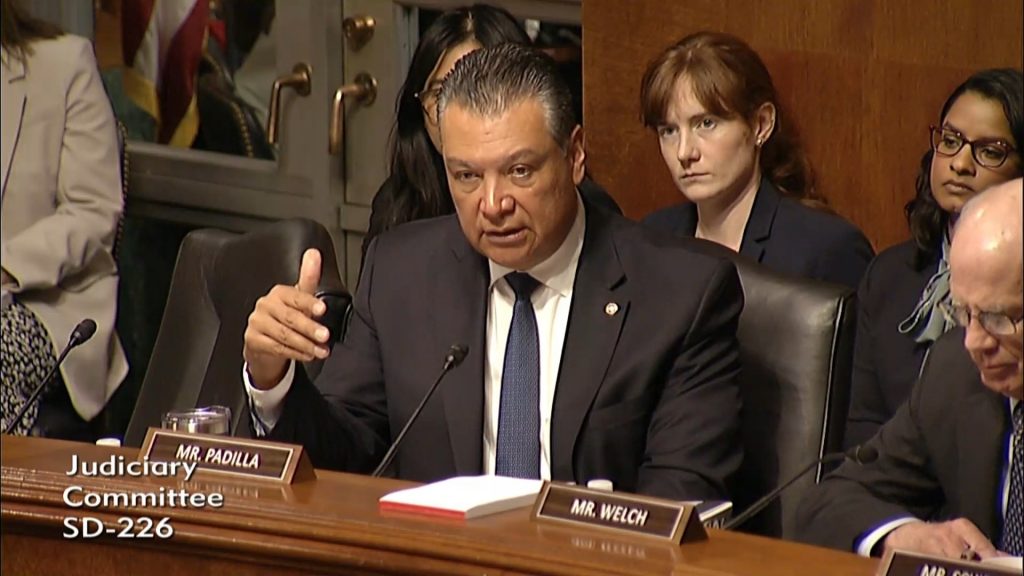Padilla Debunks Republican Narrative That “Activist Judges” Are Blocking Trump’s Agenda

WASHINGTON, D.C. — Today, U.S. Senator Alex Padilla (D-Calif.) joined a Senate Judiciary Committee hearing to question witnesses on the false Republican narrative that Democratic-appointed judges alone are preventing the President from implementing his agenda. Senator Padilla debunked these claims in his questioning of Georgetown University professor Stephen I. Vladeck.
Vladeck recently found that, contrary to claims made by the President, Elon Musk, and other Trump allies, injunctions against President Trump’s actions have been issued at similar levels by both Democratic- and Republican-appointed judges. Additionally, cases seeking to stop unlawful Trump actions have actually been brought to a much wider range of courts than during the Biden Administration, when Republicans targeted specific courts and judges in Texas, Louisiana, and Missouri that aligned with their political viewpoints. In total, as of last Friday, 46 of 67 cases where plaintiffs have sought an injunction or a temporary restraining order during the second Trump Administration have successfully been granted by judges appointed by presidents of both parties.
- PADILLA: Now there’s members of the Committee from the other side of the aisle that are trying to claim that there’s a few “radical judicial activists” standing in the way of President Trump’s agenda, but just as in his first term, it seems that the President’s disregard for the law is actually the biggest thing standing in the way of his agenda. So I want to walk through some of the statistics again with you. … How many judges have heard these cases? And if you’re able to tell or even have a ballpark, these judges were appointed by a president of which party?
- VLADECK: Sure. So it’s 39 different judges appointed by five presidents of both parties, including two Republican presidents, President Reagan, President Bush. And the cases are not symmetrically distributed, but the success rate’s pretty close. …
- PADILLA: Okay, that’s encouraging to demonstrate that it’s not a partisan lens with which these judges are acting. Now, when it comes to geography, can you speak to where these judges sit? Are they concentrated in one region, one appellate court jurisdiction, or one district, or are they spread around the country?
- VLADECK: It’s been, I mean, it’s been spread much further around the country than what we saw, for example, during the Biden Administration. So we’ve seen 11 different district courts, in the 46 cases that have blocked Trump policies, 11 different district courts in seven different circuits, which is a pretty big shift from as recently as a couple years ago, when most of the nationwide injunctions against Biden policies were coming from district courts in Texas, Louisiana, and Missouri.
Padilla also asked Vladeck about the harmful impacts of the Trump Administration’s unprecedented executive orders attacking individual law firms or lawyers who represent clients challenging President Trump’s agenda.
- PADILLA: We’re seeing attacks on the legal community and specific firms or lawyers that represent clients and causes at odds with the President’s ambition. Can you speak to the chilling effect that these targeted executive orders are having on the legal community and their ability and willingness to take on clients or employees that might dare to disagree with President Trump?
- VLADECK: Yeah, I mean, I think we’re seeing a chilling effect, Senator, in some of the law firms that are, you know, making these agreements with the President to not represent particular clients, to devote hundreds of millions of dollars to pro bono litigation in support of the President’s agenda. You know, that kind of distortion is a problem, not because of Democrats versus Republicans. That kind of distortion is a problem because, as the Supreme Court itself explained in 2001, meaningful access to lawyers is actually central to the ability of the courts to play their essential role in our Constitutional system.
Video of Senator Padilla’s full line of questioning is available here.
More information on the hearing is available here.
###